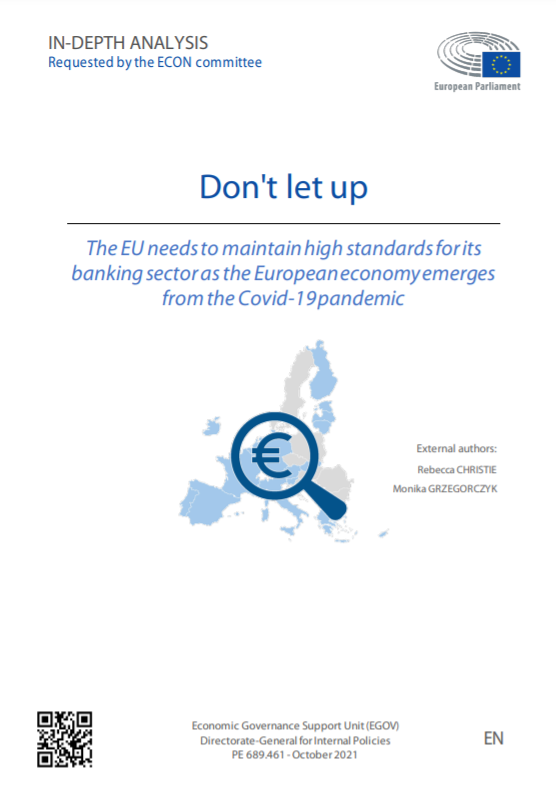Blog Post
Europe’s banking union should learn the right lessons from the US
In revived discussions on European banking union, some have suggested a new regime to deal with failing banks, alongside existing ones, drawn from parts of the United States’ bank resolution framework. This fragmented approach could be counterproductive. Europe should adopt a unitary regime, like the US, that applies to all banks irrespective of size.
In late September, the European Union reiterated its members’ commitment to press on with the ambitious banking reform discussion begun before the COVID-19 pandemic. The aim, Eurogroup president Paschal Donohoe said, would be “to make further concrete progress on the Banking Union by the end of the year”. Several officials, including at the Bank of Italy, the German finance ministry, and the Single Resolution Board (SRB) – the Brussels-based EU agency that acts as a hub for implementation in the euro area of bank resolution rules – have proposed a new EU bank-liquidation regime as a centrepiece of reform. In doing so they have referred implicitly or explicitly to the United States Federal Deposit Insurance Corporation (FDIC) model, with the suggestion that parts of the US regime for dealing with failed banks could be imported into Europe.
EU officials are right to position the banking union as an essential part of their resilience and recovery strategy, and to not let COVID-19 derail necessary debates. However, the reinvigorated discussion has become increasingly confused. The idea of bringing only parts of the US regime for dealing with failed banks into Europe could prove counterproductive. Using the experience of the FDIC to bolster arguments in favour of further fragmenting Europe’s existing fragmented regime is particularly problematic. In fact, a closer look at the FDIC model highlights the value of a single process for resolving all deposit-taking banks, no matter how large or small.
The banking union is an effort to pool the instruments of banking-sector policy at the European level, premised on the generally shared view that linkages between banking policy and national budgets undermine the integrity of the euro area, because they threaten fragmentation along national lines – fragile banks undermining national sovereign creditworthiness and vice versa, distorting the impact of the ECB’s single monetary policy. The first step in this effort, the assumption of bank prudential supervision by the European Central Bank, has been in operation for six years. It has successfully passed the major test posed by COVID-19, swiftly granting banks leeway to absorb pandemic-related losses, while suspending their dividend distributions to preserve their capital. On the other hand, the EU’s bank crisis management framework remains a half-built house. Most of it is enshrined in the Bank Recovery and Resolution Directive (BRRD) of 2014. In a number of cases of bank failures since that law went into effect, the crisis framework has fallen short of its principal goal of forestalling taxpayer bailouts. This experience has driven a growing consensus that the European crisis management and resolution regime needs significant reform.
There is an inescapable irony to invoking the FDIC as a model for reform, however. It was the FDIC’s success, after all, that provided much of the inspiration for the bank resolution process established by the BRRD in the first place. But unlike in the US, EU lawmakers decided that the BRRD resolution procedure would only be applicable to those banks deemed of public interest following a “public interest assessment” (PIA), for which the BRRD only outlined the vaguest of criteria. Failing banks that receive a negative PIA would be left to national insolvency regimes. In contrast, the FDIC is the sole resolution authority for all deposit-taking institutions (ie banks) in the United States, irrespective of size, systemic importance, state or federal charter. The FDIC is also responsible for the as-yet untested Orderly Liquidation Authority for systemically important non-bank entities, including large bank holding companies. For banks, the FDIC has no equivalent to the BRRD’s PIA process that might allow it to hand over the failing institution to a less squeamish undertaker.
A closer look at the incentive structure behind recent bank failure controversies reveals the sort of dysfunction that results from maintaining multiple potentially overlapping regimes.
Dealing with a failing bank is a thankless business, especially if one lacks access to unlimited public resources to bail out the various stakeholders. The resolution process under the BRRD severely restricts bail-out options. Some national insolvency regimes are less stringent and leave the door open to generous bail-outs. This puts immense pressure on the authority in charge of conducting public interest assessments to deliver a negative PIA and keep the ailing bank out of EU resolution. In June 2017, the SRB’s negative assessments of two mid-sized banks in the Veneto region of Italy preceded their administrative liquidation under Italian law, in a process managed by the Bank of Italy, with generous financial support from the Italian government. This was in line with the letter of BRRD, but at odds with its spirit: when proposing the BRRD on 6 June 2012, then Commission President José Manuel Barroso stressed that it would “help protect our taxpayers … from the impact of any future bank failure”. It defies common sense to declare that a bank is deemed not of public interest, only to have it benefit from more, not less, public financial support than if it was.
Unlike the SRB, the FDIC cannot wash its hands of a failing bank – there is no one else to handle the mess. The unitary structure lends itself to formal and informal public accountability, and has led to continual reform and gradual improvement in FDIC’s practice over several cycles of bank failures that now span more than eight decades. For its part, the SRB not only has defended its decision on the two Veneto banks, but has elevated it to a point of general policy, with the SRB Chair emphasising that BRRD resolution was “for the few, not the many”. This position leaves many significant banks in the banking union beyond the reach of one of its key institutions, contrary to the expressed initial intent of BRRD legislators.
The absence of a common deposit insurance authority in the euro area compounds the regime arbitrage problem. As its name indicates, the FDIC manages deposit insurance for all banks in the United States. By contrast, the 21-country banking union (19 euro-area countries plus Bulgaria and Croatia) has national deposit insurance regimes (or several of them in some countries), national resolution authorities, national institutions in charge of insolvency processes, plus the SRB: countless cooks in the bank-failure kitchen, where the United States has only one.
We used the FDIC as a starting point for our analysis (further detailed in a 2019 paper for the European Parliament). We do not aim here to address all aspects of the technically complex matter. We nevertheless submit three suggestions for the EU reform debate.
First, policymakers should not rush for a piecemeal solution at a time when pandemic-related risks loom large. Pre-pandemic, completing the banking union was arguably the most important priority of the European Commissioner for financial services. But now, the more immediate priority is to address the COVID-19 crisis, including by implementing the Next Generation EU recovery blueprint. Stalling recovery and economic deterioration could lead to bank failures or require bank recapitalisation, probably before any significant banking union reform can be enacted, meaning any crisis management measures will have to be handled with the existing legislation anyway.
Second, EU reformers should consider the trade-offs embedded in the design of the FDIC and its evolution over time, including stronger protection of all deposits, even uninsured ones, but also the lesser implicit protection of other creditors – the FDIC’s track record establishes that its pledge not to bail these out is credible, at least for institutions up to a fairly significant size (Washington Mutual, resolved in 2008, had around $300 billion in assets).
Third, the EU should take away the right lesson from the FDIC’s history, and pursue an integrated approach to the banking union. That is to say: a unitary regime to handle all bank failures, amending and improving the BRRD resolution concept, encompassing reform of mandatory deposit insurance that would integrate it under the SRB. A European system that matches the FDIC’s performance would reduce the future fiscal impact of banking crises. It would still entail financial risk-sharing through the deposit insurance and resolution mechanism and its necessary public backstop, but Next Generation EU will facilitate that by giving the EU its own financial firepower.
Doing so will surely take more than a few months. But adding a third regime to the existing two will also take significant time and waste a lot of reform energy, while making the system even more fragmented and dysfunctional. Instead, policymakers should focus on a comprehensive approach that, when implemented, will be effective and foster predictability. If that requires some more time for careful debate and preparation, it will be time well spent.
Recommended citation:
Gelpern, A. and Veron, N. (2020) ‘Europe’s banking union should learn the right lessons from the US’, Bruegel Blog, 29 October
Republishing and referencing
Bruegel considers itself a public good and takes no institutional standpoint. Anyone is free to republish and/or quote this post without prior consent. Please provide a full reference, clearly stating Bruegel and the relevant author as the source, and include a prominent hyperlink to the original post.



















